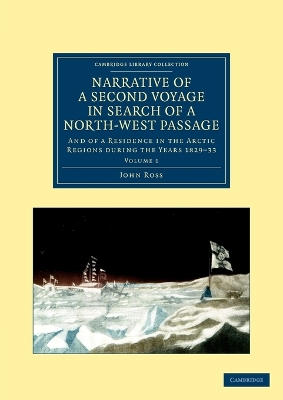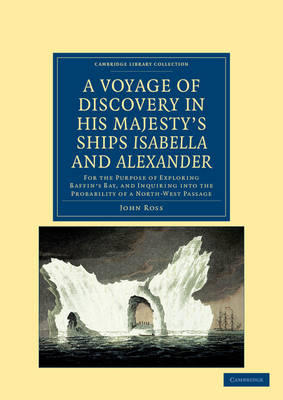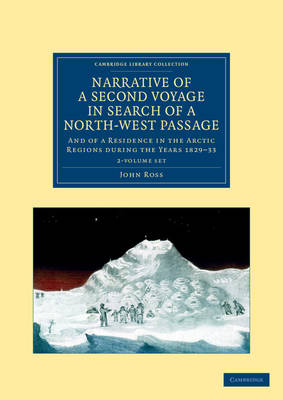Cambridge Library Collection - Polar Exploration
2 primary works • 6 total works
Volume 1
Polar explorer John Ross (1777-1856) sailed with William Edward Parry in 1818 to seek a North-West Passage from Baffin Bay. The attempt was unsuccessful, and Ross was widely blamed for its failure. In 1829 he set out on a privately funded expedition on the steamship Victory, accompanied by his nephew James Clark Ross, to try again, returning to England in late 1833. Using survival techniques learnt from the Inuit he befriended, Ross kept his crew healthy through four icebound winters. While the voyage once again failed to find a North-West Passage, it surveyed the Boothia Peninsula and a large part of King William Land. It was also valuable for its scientific findings, with J. C. Ross discovering the magnetic north pole. Ross published this two-volume work in 1835. Volume 1 summarises previous Polar exploration before describing the voyage in great detail, from preparations to the return in 1833.
Volume 2
Appendix to the Narrative of a Second Voyage in Search of a North-West Passage: Volume 2
by John Ross
Published 17 May 2012
Polar explorer John Ross (1777-1856) sailed with William Edward Parry in 1818 to seek a North-West Passage from Baffin Bay. The attempt was unsuccessful, and Ross was widely blamed for its failure. In 1829, he set out on a privately funded expedition on the steamship Victory, accompanied by his nephew James Clark Ross, to try again, returning to England in late 1833. Using survival techniques learnt from the Inuit he befriended, Ross kept his crew healthy through four icebound winters. While the voyage once again failed to find a North-West Passage, it surveyed the Boothia Peninsula and a large part of King William Land. It was also valuable for its scientific findings, with J. C. Ross discovering the magnetic pole. Ross published this two-volume work in 1835. Volume 2 contains scientific reports, ethnological information on the Inuit, an Eskimo vocabulary and comments on natural history.
Sir John Ross (1777-1856), the distinguished British naval officer and Arctic explorer, undertook three great voyages to the Arctic regions; accounts of his first and his second voyages are also reissued in this series. (During the latter, his ship was stranded in the unexplored area of Prince Regent Inlet, where Ross and his crew survived by living and eating as the local Inuit did.) In this volume, first published in 1855, the explorer describes his experiences during his third (privately funded) Arctic voyage, undertaken in 1850 as part of the effort to locate the missing expedition led by Sir John Franklin, his close friend. Ross also summarises in partisan style the previous efforts by the Royal Navy to find out what happened to the Erebus and Terror, and is scathing in his account of what he regards as the mismanagement and incompetence of the Admiralty.
A Voyage of Discovery, Made under the Orders of the Admiralty, in His Majesty's Ships Isabella and Alexander
by John Ross
Published 1 December 2011
Sir John Ross (1777-1856) was a Scottish naval officer and Arctic explorer. He joined the Royal Navy at the age of nine and distinguished himself during the Napoleonic Wars. In 1818, Ross was assigned to H.M.S. Isabella and commissioned to search for the North-West Passage. This book, published in 1819, describes the expedition, which was unsuccessful although it did discover new facts about Baffin Bay. Several of Ross's former officers disputed his account of the decision to turn back at Lancaster Sound, which he had mistakenly believed was impassable. The ensuing controversy affected the rest of Ross's career and made him unpopular with influential contemporaries including Sir John Barrow and William Edward Parry. It also soured relations with his young nephew James Clark Ross, who had accompanied him, and who in 1831, during a second eventful expedition with his uncle, identified the location of the magnetic North Pole.
Narrative of a Second Voyage in Search of a North-West Passage 2 Volume Set
by John Ross
Published 17 May 2012
Polar explorer John Ross (1777-1856) sailed with William Edward Parry in 1818 to seek a North-West Passage from Baffin Bay. The attempt was unsuccessful, and Ross was widely blamed for its failure. In 1829 he set out on a privately funded expedition on the steamship Victory, accompanied by his nephew James Clark Ross, to try again, returning to England in late 1833. Using survival techniques learnt from the Inuit he befriended, Ross kept his crew healthy through four icebound winters. While the voyage once again failed to find a North-West Passage, it surveyed the Boothia Peninsula and a large part of King William Land. It was also valuable for its scientific findings. Ross published this two-volume work in 1835. Volume 1 summarises previous Polar exploration before describing the voyage; Volume 2 contains scientific reports, information on the Inuit, and a vocabulary of their language.
Narrative of a Second Voyage in Search of a North-West Passage: Volume 1
by John Ross
Published 5 May 2013
Polar explorer John Ross (1777-1856) sailed with William Edward Parry in 1818 to seek a North-West Passage from Baffin Bay. The attempt was unsuccessful, and Ross was widely blamed for its failure. In 1829 he set out on a privately funded expedition on the steamship Victory, accompanied by his nephew James Clark Ross, to try again, returning to England in late 1833. Using survival techniques learnt from the Inuit he befriended, Ross kept his crew healthy through four icebound winters. While the voyage once again failed to find a North-West Passage, it surveyed the Boothia Peninsula and a large part of King William Land. It was also valuable for its scientific findings, with J. C. Ross discovering the magnetic north pole. Ross published this two-volume work in 1835. Volume 1 summarises previous Polar exploration before describing the voyage in great detail, from preparations to the return in 1833.



